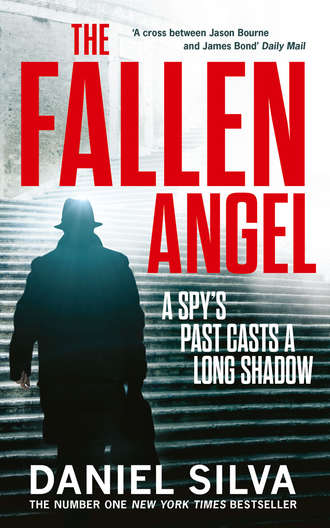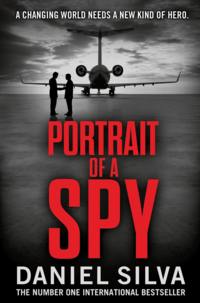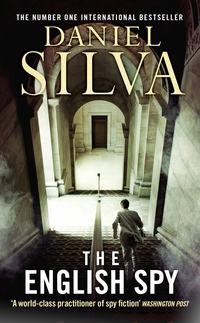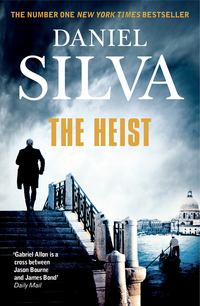
Полная версия
The Fallen Angel
“I’ve been in far worse places than this.”
“And you will be again unless you cooperate.”
The general lit an American cigarette. He smoked it somewhat awkwardly with his left hand. The right, the one missing two fingers, was concealed in his lap.
“Why was the monsignor so concerned about this woman?” he asked.
Gabriel told him about the review of the Vatican’s antiquities.
“I was led to believe it was nothing more than a routine inventory.”
“It might have started that way. But it appears that somewhere along the line, Claudia uncovered something else.”
“Do you know what?”
“No.”
Ferrari scrutinized Gabriel as if he didn’t quite believe him. “Why were you sniffing around Falcone’s place?”
“Dr. Andreatti was in contact with him shortly before her death.”
“How do you know this?”
“I found his phone number in her records.”
“She called him from her office at the Vatican?”
“From her mobile,” said Gabriel.
“How were you, a foreigner residing in this country temporarily, able to obtain the mobile phone records of an Italian citizen?”
When Gabriel made no reply, Ferrari eyed him over the tip of his cigarette like a marksman lining up a difficult shot.
“The most logical explanation is that you called upon friends in your old service to retrieve the records for you. If that’s the case, you violated your agreement with our security authorities. And that, I’m afraid, places you in a very precarious position indeed.”
It was a threat, thought Gabriel, but only a mild one.
“Did you ever speak to Falcone yourself?” the general asked.
“I tried.”
“And?”
“He wasn’t answering his phone.”
“So you decided to break into his property?”
“Out of concern for his safety.”
“Oh, yes, of course,” said Ferrari sarcastically. “And once inside, you discovered what appeared to be a large cache of antiquities.”
“Along with a tombarolo simmering in a pot of hydrochloric acid.”
“How did you get past the locks?”
“The dog was more of a challenge than the locks.”
The general smiled, one professional to another, and tapped his cigarette thoughtfully against his ashtray. “Roberto Falcone was no ordinary tombarolo,” he said. “He was a capo zona, the head of a regional looting network. The low-level looters brought him their goods. Then Falcone moved the product up the line to the smugglers and the crooked dealers.”
“You seem to know a great deal about a man whose body was discovered just a few hours ago.”
“That’s because Roberto Falcone was also my informant,” the general admitted. “My very best informant. And now, thanks to you, he’s dead.”
“I had nothing to do with his death.”
“So you say.”
A uniformed aide knocked discreetly on Ferrari’s door. The general waved him away with an imperious gesture and resumed his doge-like pose of solemn deliberation.
“As I see it,” he said at last, “we have two distinct options before us. Option one, we handle everything by the book. That means throwing you to the wolves at the security service. There might be some negative publicity involved, not only for your government but for the Vatican as well. Things could get messy, Allon. Very messy indeed.”
“And the second option?”
“You start by telling me everything you know about Claudia Andreatti’s death.”
“And then?”
“I’ll help you find the man who killed her.”
11
PIAZZA DI SANT’IGNAZIO, ROME
AMONG THE PERQUISITES OF WORKING at the palazzo was Le Cave. Regarded as one of the finest restaurants in Rome, it was located just steps from the entrance of the building, in a quiet corner of the piazza. In summer the tables stood in neat rows across the cobbles, but on that February evening they were stacked forlornly against the outer wall. General Ferrari arrived without advance warning and was immediately shown, along with his two guests, to a table at the back of the room. A waiter brought a plate of arancini di riso and red wine from Ferrari’s native Campania. The general made a toast to a marriage that, for the moment, had yet to be consummated. Then, as he picked at one of the risotto croquettes, he spoke disdainfully of a man named Giacomo Medici.
Though he bore no relation to the Florentine banking dynasty, Medici shared the family’s passion for the arts. A broker of antiquities based in Rome and Switzerland, he had quietly supplied high-quality pieces for decades to some of the world’s most prominent dealers, collectors, and museums. But in 1995, his lucrative business began to unravel when Italian and Swiss authorities raided his warehouse in the Geneva Freeport and found a treasure trove of unprovenanced antiquities, some of which had clearly been recently excavated. The discovery touched off an international investigation led by the Art Squad that would eventually ensnare some of the biggest names in the art world. In 2004, an Italian court convicted Medici of dealing in stolen antiquities and gave him the harshest sentence ever handed down for such a crime—ten years in prison and a ten-million-euro fine. Italian prosecutors then used the evidence against Medici to secure the return of looted artifacts from several prominent museums. Among the items was the renowned Euphronios krater, which New York’s Metropolitan Museum of Art reluctantly agreed to return to Italy in 2006. Medici, who was accused of playing a key role in the vessel’s looting, had famously posed before its display case at the Met with his arms akimbo. General Ferrari had mimicked the pose on the day the krater was triumphantly placed in its new display case at Rome’s Villa Giulia museum.
“All told,” Ferrari continued, “Medici was responsible for the looting of thousands of antiquities from Italian soil. But he didn’t do it alone. His operation was like a cordata, a rope that stretched from the tombaroli to the capi zoni to the dealers and auction houses and, ultimately, to the collectors and museums. And let’s not forget our good friends in the Mafia,” Ferrari added. “Nothing came out of the ground without their approval. And nothing went to market without a payoff to the bosses.”
Ferrari spent a moment contemplating his ruined hand before resuming his briefing. “We didn’t spend ten years and millions of euros just to bring down one man and a few of his lieutenants. Our goal was to destroy a network that was slowly pillaging the treasures bequeathed to us by our ancestors. Against all odds, we managed to succeed. But I’m afraid our victory was only temporary. The looting continues. In fact, it’s worse than ever.”
“A new network has taken the place of Medici’s?”
Ferrari nodded and then indulged in a disciplined sip of wine. “Criminals are a bit like terrorists, Allon. If you kill a terrorist, a new terrorist is sure to take his place. And almost without fail, he is more dangerous than his predecessor. This new network is far more sophisticated than Medici’s. It’s a truly global operation. And, obviously, it’s far more ruthless.”
“Who’s running it?”
“I wish I knew. It could be a consortium, but my instincts tell me it’s one man. I’d be surprised if he has any overt links to the antiquities trade. That would be beneath him,” the general added quickly. “He’s a major criminal who’s into more than selling hot pots. And he has the muscle to keep everyone in line, which means he’s connected to the Mafia. This network has the ability to rip a statue out of the ground in Greece and sell it at Sotheby’s a few months later with what appears to be an entirely clean provenance.” The general paused, then added, “He’s also getting product from your neck of the woods.”
“The Middle East?”
“Someone’s been supplying him with artifacts from places like Lebanon, Syria, and Egypt. There are some nasty people in that part of the world. One wonders where all the money is going.”
“Where did Falcone fit into the picture?”
“When we stumbled upon his operation a few years ago, I convinced him to go to work for me. It wasn’t difficult,” Ferrari added, “since the alternative was a long prison sentence. We spent several weeks debriefing him here at the palazzo. Then we sent him back to Cerveteri and allowed him to resume his wicked ways.”
“But now you were looking over his shoulder,” Chiara said.
“Exactly.”
“What would happen when a tombarolo brought him a vase or a statue that he’d found?”
“Sometimes we quietly took it off the market and put it away for safekeeping. But usually we allowed Falcone to sell it up the line. That way we could track it as it moved through the bloodstream of the illicit trade. And we wanted everyone in the business to think that Roberto Falcone was a man to be reckoned with.”
“Especially the man at the top of this new smuggling network.”
“You’ve obviously done this a time or two yourself,” the general said.
Gabriel ignored the remark. “How high were you able to get him into the network?” he asked.
“Only the first rung of the ladder,” Ferrari said, frowning. “This new network learned from the mistakes of its predecessor. The men at the top don’t talk to people like Roberto Falcone.”
“So why was Claudia Andreatti talking to him?”
“Clearly, she must have found something during her review of the Vatican’s collection that led her to Falcone’s door. Something dangerous enough to get her killed. The fact that Falcone was killed too suggests it had something to do with the network. Frankly, I wouldn’t be surprised if a few more bodies turn up in short order.”
“Do you realize what you’re suggesting?”
Ferrari trained his sightless eye on Gabriel and leaned across the table. “It’s not a suggestion,” he said. “I’m saying that Dr. Andreatti discovered a connection between the network and the Vatican. And that means your friend Monsignor Donati has a much bigger problem on his hands than a dead curator. It also means that you and I are pursuing the same target.”
“Which is why you’re willing to pretend that my wife and I were never in Cerveteri today,” Gabriel said. “Because if I can find out who killed Claudia, it will save you the trouble of having to crack the network.”
“It is a rather elegant solution to our dilemma,” Ferrari said.
“Why don’t you just hand me over to the security service and pursue the case yourself?”
“Because now that Falcone is dead, the only door into this new network has been slammed in my face. The chances of putting another informant in place are slim. By now, they’re well aware of my tools and techniques. They also know my personnel, which makes it difficult for me to send them undercover. I need someone who can help me destroy this network from the inside, someone who can think like a criminal.” The general paused. “Someone like you, Allon.”
“Is that supposed to be a compliment?”
“Just a statement of fact.”
“You overestimate my abilities.”
The general gave a knowing smile. “Early in my career, when I was working in the counterterrorism division, I was assigned to a case here in Rome. It seemed a Palestinian translator was shot to death in the lobby of his apartment building. It turned out he was no ordinary translator. As for the man who killed him, we were never able to find a single witness who could recall seeing him. It was as if he were a ghost.” The general paused. “And now he sits before me, in a restaurant in the heart of Rome.”
“I would have never figured you for a blackmailer, General.”
“I wouldn’t dream of trying to blackmail you, Allon. I was simply saying that our paths crossed once before. Now it seems fate has reunited us.”
“I don’t believe in fate.”
“Neither do I,” Ferrari replied. “But I do believe that if there’s anyone who can crack this network, it’s you. Besides,” he added, “the fact that you are already positioned inside the Vatican gives you a distinct advantage.”
Gabriel was silent for a moment. “What happens if I succeed?” he asked finally.
“I will take your information and build a case that will stand up in the Italian courts.”
“And what if that case destroys my friends?”
“I am well aware of your close relationship with this pope and with Monsignor Donati,” the general said evenly. “But if the Vatican has engaged in misdeeds, it will have to atone. Besides, I’ve always found that confession can be good for the soul.”
“If it’s done in private.”
“That might not be possible. But the best way for you to look after the interests of your friends is to accept my offer. Otherwise, there’s no telling what dirt might turn up.”
“That sounds a great deal like blackmail.”
“Yes,” the general said reflectively, “I suppose it does.”
He was smiling slightly, but his prosthetic eye stared blankly into space. It was like gazing into the eye of a figure in a painting, thought Gabriel, the all-seeing eye of an unforgiving God.

Which left only Roberto Falcone—or, more precisely, what to tell the public about his unfortunate demise. Ultimately, it came down to a choice of tactics. The matter could be handled quietly, or, as Gabriel put it, they could announce Falcone’s death with a fanfare of trumpets and thus help their own cause in the process. Ferrari chose the second option, for, like Gabriel, he was predisposed toward operational showmanship. Besides, it was budget time in a season of austerity, and Ferrari needed a victory, even an invented one, to ensure the Art Squad’s enviable funding levels continued for another fiscal year.
And so late the following morning, Ferrari summoned the news media to the palazzo for what he promised would be a major announcement. It being an otherwise slow news day, they came in droves, hoping for something that might actually sell a newspaper or entice a television viewer to pause for a few seconds before surfing off to the next channel. As usual, the general did not disappoint. Impeccably dressed in his blue Carabinieri uniform, he strode to the podium and proceeded to spin a tale as old as Italy itself. It was a tale of a man who appeared to be of modest means but was in fact one of Italy’s biggest looters of antiquities. Regrettably, the man had been brutally murdered, perhaps in a dispute with a colleague over money. The general did not specify exactly how the body was discovered, though he doled out enough of the gruesome details to guarantee front-page play in the livelier tabloids. Then, with the flawless timing of a skilled performer, he drew back a black curtain, revealing a treasure trove of artifacts recovered from the tombarolo’s workshop. The reporters let out a collective gasp. Ferrari beamed as the cameras flashed.
Needless to say, the general made no mention of the role played by the retired Israeli spy and art restorer Gabriel Allon or of the somewhat Machiavellian agreement the two men had reached over dinner at Le Cave. Nor did he divulge the name he had whispered into Gabriel’s ear as they parted company in the darkened piazza.
Gabriel waited until the end of the general’s news conference before ringing her. It was clear from her tone that she had been expecting his call.
“I’m in a meeting until five,” she said. “How about five-thirty?”
“Your place or mine?”
“Mine is safer.”
“Where?”
“The krater,” she said. And then the line went dead.
12
VILLA GIULIA, ROME
IN A CITY FILLED WITH museums and archaeological wonders, the Villa Giulia, Italy’s national repository of Etruscan art and antiquities, somehow manages to keep a low profile. Rarely visited and easily missed, it occupies a rambling palazzo on the edge of the Borghese Gardens that was once the country house of Pope Julius III. In the sixteenth century, the villa had overlooked the city walls of Rome and the gentle tan slopes of the Parioli hills. Now the hills were lined with apartment blocks, and beneath the windows of the old papal retreat thundered a broad boulevard that pedestrians crossed at their own risk. The weedy forecourt had been turned into the staff parking lot. The battered fenders and sun-faded paint bore witness to the low wages earned by those who toiled within the state museums of Italy.
Gabriel arrived at 5:15 and made his way to the second-floor gallery where the Euphronios krater, regarded as one of the greatest single pieces of art ever created, resided in a simple glass display case. A small placard told of the vessel’s tangled history—how it had been looted from a tomb near Cerveteri in 1971 and sold to the Metropolitan Museum of Art for the astonishing price of one million dollars, and how, thanks to the tireless efforts of the Italian government, it had finally been returned to its rightful home. Cultural patrimony had been protected, thought Gabriel, looking around the uninhabited room, but at what cost? Nearly five million people visited the Met each year, but here in the deserted halls of the Villa Giulia, the krater was left to stand alone with the sadness of a knickknack gathering dust on a shelf. If it belonged anywhere, he thought, it was in the tomb of the wealthy Etruscan who had purchased it from a Greek trader two and a half thousand years ago.
Gabriel heard the clatter of high heels and, turning, glimpsed a tall, elegant woman coming through the passage from the adjoining gallery. Dark hair fell softly about her shoulders, and wide brown eyes shone intelligently from her face. The cut of her suit suggested a source of income beyond the museum, as did the jewelry that sparkled on the suntanned hand she extended in Gabriel’s direction. She held the embrace for a moment longer than was necessary, as though she had been waiting to meet him for some time. She seemed well aware of the impact of her appearance.
“You were expecting someone in a white lab coat?”
“I only know one archaeologist,” said Gabriel, “and he’s usually covered in dirt.”
Dr. Veronica Marchese gave a fleeting smile. She was at least fifty, but even in the unflattering halogen light of the museum she could have easily passed for thirty-five. Her name, when spoken by General Ferrari, had been instantly familiar to Gabriel, for it had appeared dozens of times in Claudia’s e-mail accounts. Now he realized her face was familiar, too. He had seen it for the first time outside the Church of St. Anne, at the conclusion of Claudia Andreatti’s funeral mass. She had been standing slightly apart from the other mourners, and her eyes had been fixed not on the casket but upon Luigi Donati. Something about her gaze, remembered Gabriel, had been vaguely accusatory.
Конец ознакомительного фрагмента.
Текст предоставлен ООО «ЛитРес».
Прочитайте эту книгу целиком, купив полную легальную версию на ЛитРес.
Безопасно оплатить книгу можно банковской картой Visa, MasterCard, Maestro, со счета мобильного телефона, с платежного терминала, в салоне МТС или Связной, через PayPal, WebMoney, Яндекс.Деньги, QIWI Кошелек, бонусными картами или другим удобным Вам способом.






